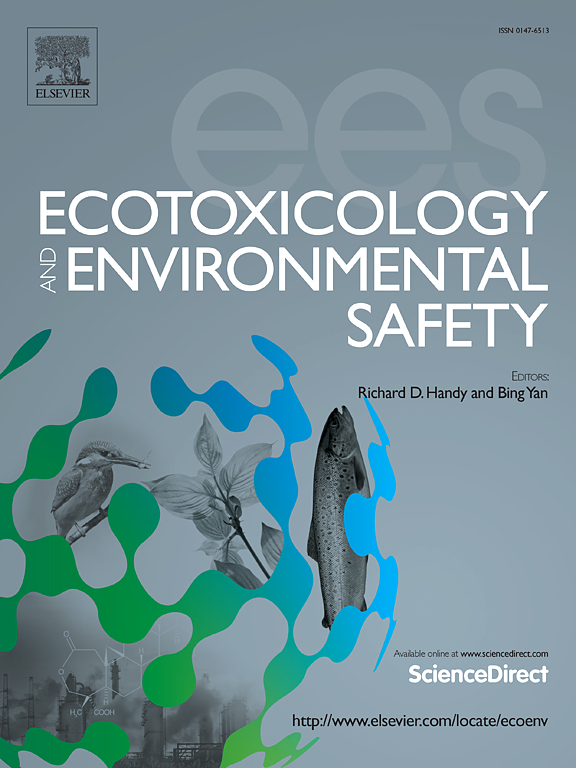Metabolic characterizations of PFOS-induced disruptions in early embryonic development
IF 6.1
2区 环境科学与生态学
Q1 ENVIRONMENTAL SCIENCES
引用次数: 0
Abstract
Background
Perfluorooctane sulfonates (PFOS) are persistent environmental pollutants linked to developmental toxicity, but the mechanisms remain unclear. This study investigates the metabolic changes induced by PFOS exposure during early embryonic development and integrates metabolomic, transcriptomic, and molecular docking analyses to explore underlying mechanisms.
Methods
Mouse embryoid bodies (mEBs) were exposed to PFOS for 2 days, 4 days and 6 days. Metabolomic profiling was conducted to identify differential metabolites. Transcriptomic data were integrated with metabolomics using Cytoscape to map metabolic pathway alterations. Molecular docking simulations were performed to assess PFOS binding to key enzymes.
Results
PFOS exposure resulted in significant alterations in lipid (Erucic acid, L-carnitine), amino acid (L-methionine, creatine, hippuric acid, and spermine), and nucleotide metabolism (e.g., hypoxanthine). Integrated transcriptomic and metabolomic analysis revealed disrupted pathways included SLC25A20 regulated L-carnitine metabolism. Molecular docking simulations indicated that PFOS binds to methionine synthase and hypoxanthine guanine phosphoribosyl transferase, potentially inhibiting their function and disrupting metabolic homeostasis for L-methionine and hypoxanthine during embryonic development.
Conclusion
PFOS exposure disrupts key metabolic pathways critical for embryogenesis, including lipid, amino acid, and nucleotide metabolism. Molecular docking and transcriptomic integration highlight enzyme targeting as a potential mechanism of PFOS-induced developmental toxicity. These findings provide novel insights into the molecular and metabolic disruptions caused by PFOS, with implications for understanding its developmental toxicity.
全氟辛烷磺酸诱发早期胚胎发育紊乱的代谢特征
全氟辛烷磺酸(PFOS)是与发育毒性有关的持久性环境污染物,但其机制尚不清楚。本研究研究了全氟辛烷磺酸暴露在胚胎早期发育过程中引起的代谢变化,并结合代谢组学、转录组学和分子对接分析来探索其潜在机制。方法小鼠胚样体(meb)分别暴露于PFOS 2、4、6 d。进行代谢组学分析以鉴定差异代谢物。使用Cytoscape将转录组学数据与代谢组学相结合,以绘制代谢途径的改变。通过分子对接模拟来评估全氟辛烷磺酸与关键酶的结合。结果spfos暴露导致小鼠脂质(芥酸、左旋肉碱)、氨基酸(l -蛋氨酸、肌酸、马尿酸和精胺)和核苷酸代谢(次黄嘌呤)发生显著变化。综合转录组学和代谢组学分析显示,SLC25A20调节左旋肉碱代谢的通路被破坏。分子对接模拟表明,PFOS与蛋氨酸合成酶和次黄嘌呤鸟嘌呤磷酸核糖基转移酶结合,可能抑制它们的功能,破坏胚胎发育过程中l -蛋氨酸和次黄嘌呤的代谢稳态。结论全氟辛烷磺酸暴露会破坏胚胎发生的关键代谢途径,包括脂质、氨基酸和核苷酸代谢。分子对接和转录组整合突出了酶靶向作为全氟辛烷磺酸诱导发育毒性的潜在机制。这些发现为全氟辛烷磺酸引起的分子和代谢破坏提供了新的见解,对理解其发育毒性具有重要意义。
本文章由计算机程序翻译,如有差异,请以英文原文为准。
求助全文
约1分钟内获得全文
求助全文
来源期刊
CiteScore
12.10
自引率
5.90%
发文量
1234
审稿时长
88 days
期刊介绍:
Ecotoxicology and Environmental Safety is a multi-disciplinary journal that focuses on understanding the exposure and effects of environmental contamination on organisms including human health. The scope of the journal covers three main themes. The topics within these themes, indicated below, include (but are not limited to) the following: Ecotoxicology、Environmental Chemistry、Environmental Safety etc.

 求助内容:
求助内容: 应助结果提醒方式:
应助结果提醒方式:


